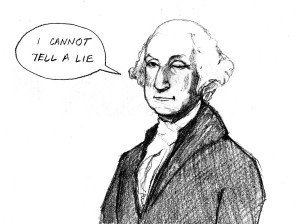Staff Columnists
Presidential morals
For much of our lives, we have seen Americans hold their politicians to a high moral standard. In 1998, President Bill Clinton was impeached for, among other things, having committed perjury when discussing his relationship with Monica Lewinksy with a grand jury. Now, it is the president’s sexual conduct that people remember, not the alleged lie—after all, it did depend upon what the definition of “is” is.—and Republicans are accused of impeaching him for having an affair. More recently, former vice presidential candidate John Edwards was lambasted for cheating on his cancer-ridden wife and for fathering a child with another woman—and being charged with six felonies in the process. In this election cycle, current presidential candidate Newt Gingrich has been attacked for his apparent inability to show fidelity in marriage while running, in part, on a platform of family values. We shouldn’t judge politicians based on their private lives, because their private lives have no bearing on how well they can serve the American people.
It was not always thus. In decades and centuries past, Americans, perhaps unaware of their politicians’ improprieties, elected them based on their extra-personal merits. In some cases, Americans even elected presidents regardless of their potential transgressions; Grover Cleveland was elected president in 1884, despite taking responsibility for fathering an illegitimate child that may not have been his own. Obsession with politicians’ personal lives, or at least allowing that obsession to influence votes, is a relatively new phenomenon and one that has absolutely no place in our political system.
The conflation of a politician’s moral fiber and his ability to lead a nation is a mind-bendingly erroneous one, and one that has no factual basis. In America, many of our greatest politicians have, in some sense, been scoundrels. Thomas Jefferson, one of our founding fathers, allegedly had an affair and fathered four children with one of his slaves and later fell in love with a married woman with whom he spent every day for six weeks. FDR dragged America out of the Great Depression, led it to victory in World War II, had long-running, recognized affairs with two women, almost divorced his wife for one of them, and was so adored by the American people that he was elected to four consecutive terms. Even George Washington was accused of some romantic wrongdoing.
These are only a few of the presidents we know of (to say nothing of LBJ and JFK) who have committed acts that would be highly controversial in today’s political climate. The number who have committed such acts but have successfully managed to hide their actions can only be guessed at. But many of the aforementioned men were renowned in their time, and none received serious or effective attacks upon his character. It is only recently, with Republican attacks on Bill Clinton, that a president or politician’s moral rectitude with regard to the home has become important, and of the past three presidents, only the one who was impeached for lying about his private life can be said to have been truly successful.
A politician’s public and private life must be kept separate. Obviously, a person who embezzles and commits fraud is ill-suited to a career in the public sector, but there is no reason to believe that one’s family values have any impact on his leadership abilities. The modern tendency to believe that the former informs the latter is entirely unsupported, and we would do well to remember that that tendency arose because of a partisan attack on a president, not because of any desire for more honesty in the position.

